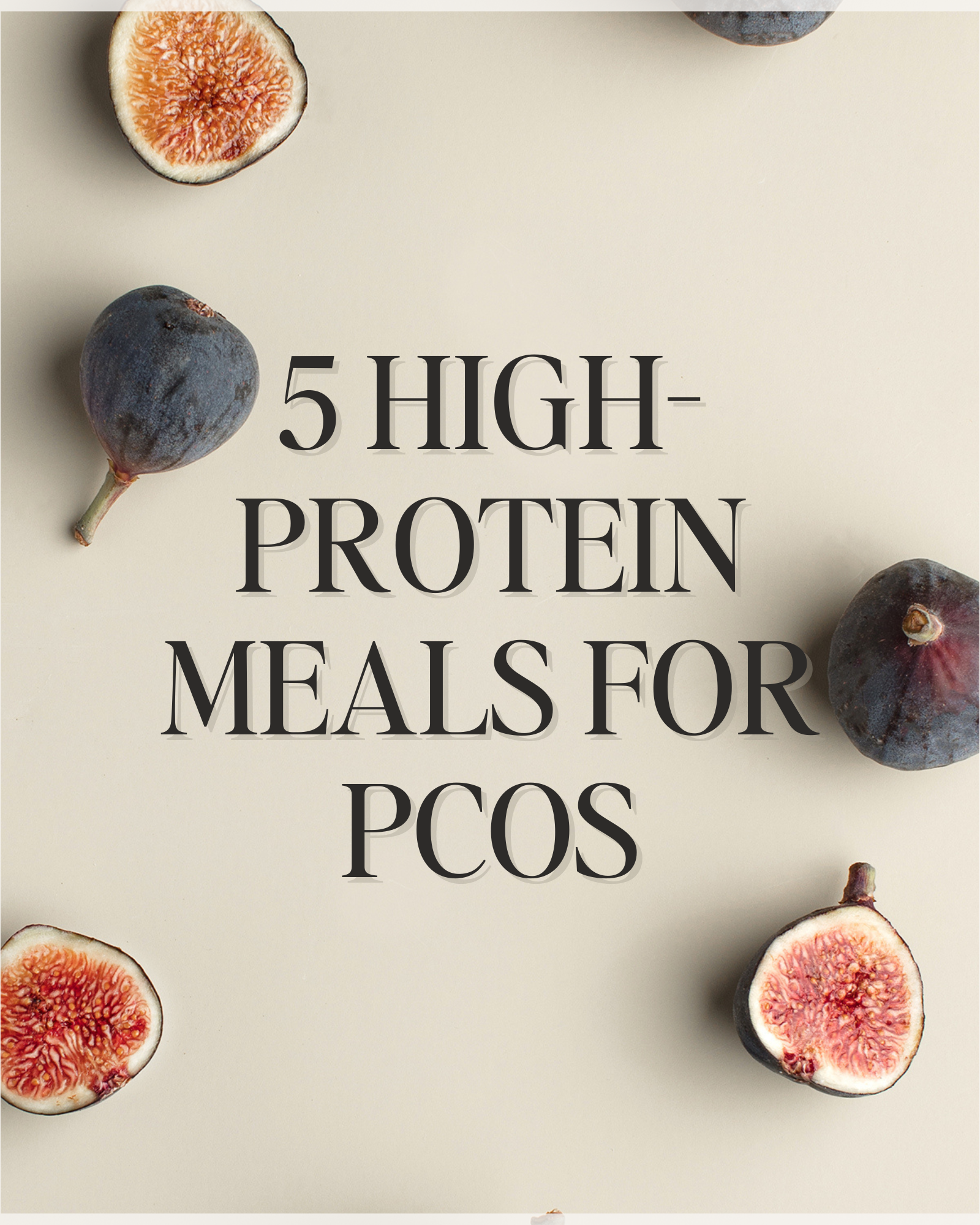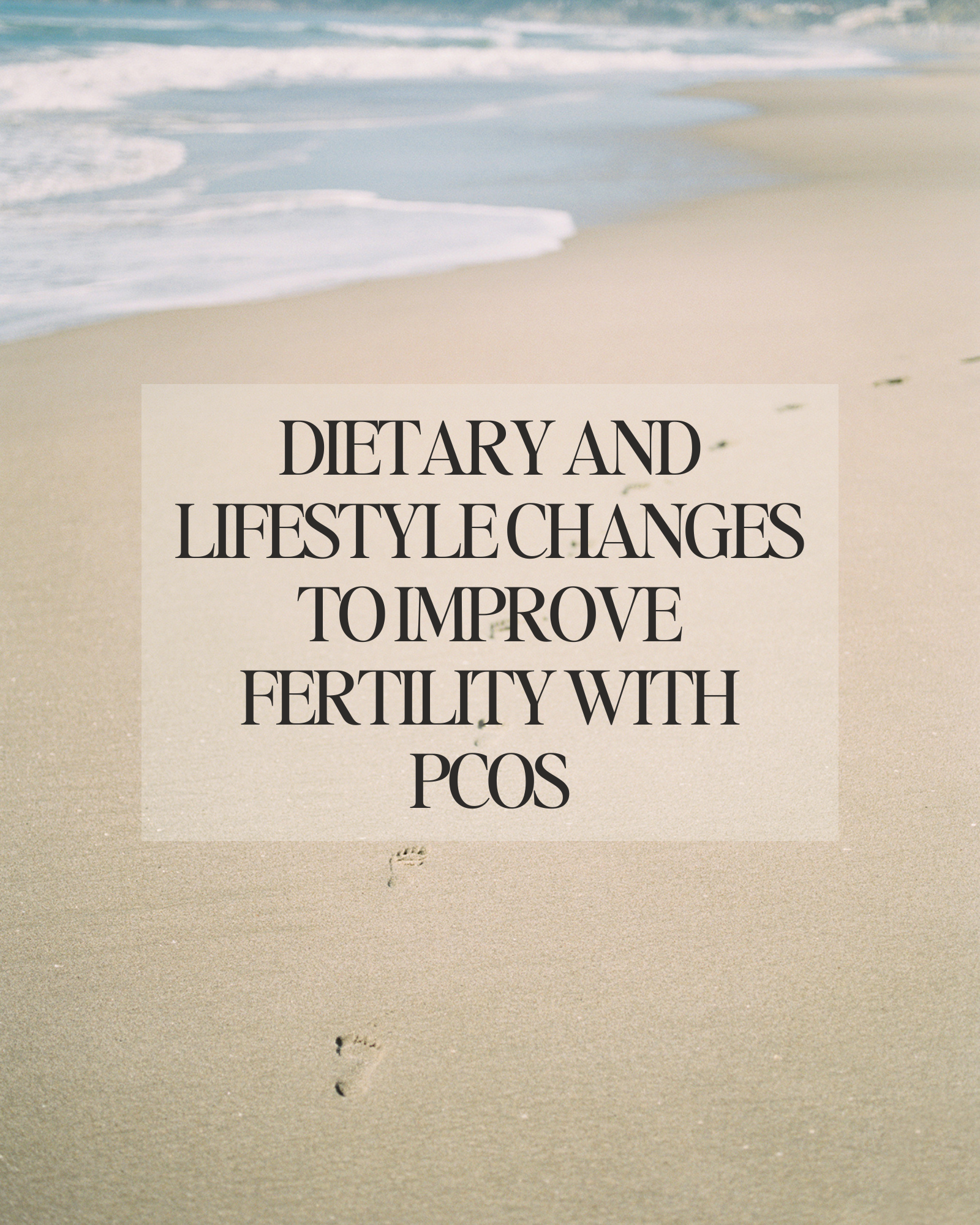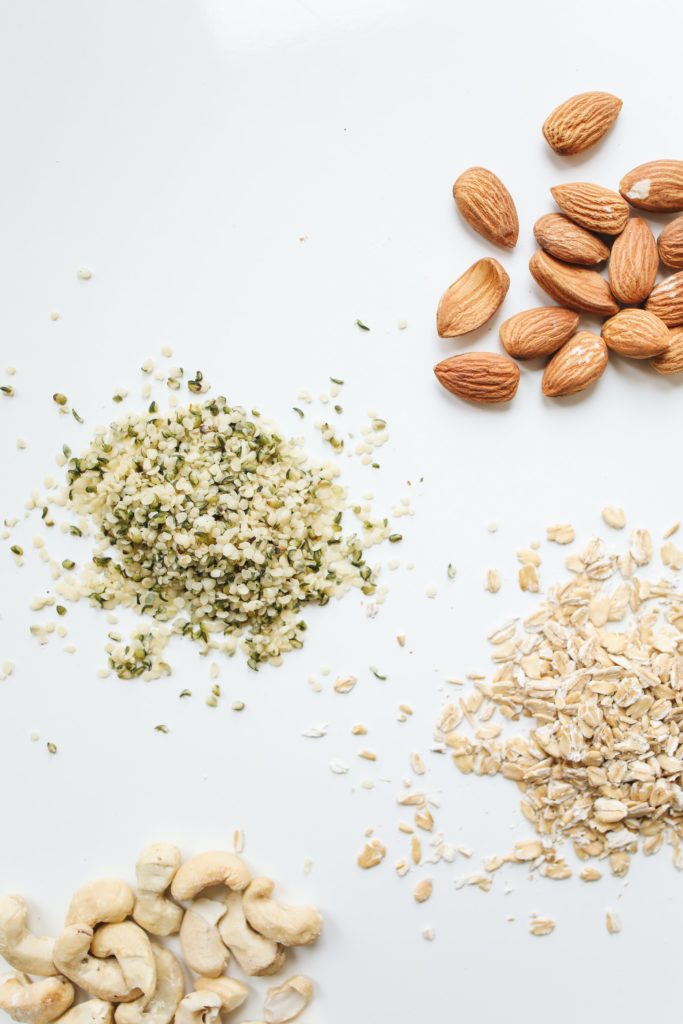PCOS
Resources
Style
Planning
View All
Balancing Macronutrients for Optimal PCOS Management
Balancing macronutrients effectively can make a substantial difference in managing PCOS symptoms. This means ensuring your meals have the right amounts of proteins, fats, and carbohydrates. It’s not just about meeting your daily caloric needs; it’s about how those calories are distributed among the macronutrients.
Proteins play a vital role not only in muscle repair but also in stabilizing your blood sugar levels. This can help reduce insulin spikes, which is particularly important for those with PCOS. Aim for 20+ grams of protein per meal to keep you feeling full and satisfied.
Fat is another essential part of your diet. It’s crucial to opt for healthy fats, such as those found in avocados, nuts, seeds, and olive oil. These not only help manage inflammation but also support hormone production, which can be particularly beneficial for PCOS management.
Carbohydrates should not be neglected, but choosing the right kind is key. Focus on non-starchy vegetables, whole grains, and legumes that provide fiber and a slow release of energy. This can help in maintaining steady blood sugar levels. Women with PCOS tend to process and break down carbohydrates more slowly than women without PCOS. This doesn’t mean you can’t eat carbs! Rather, if you have PCOS you need to be a bit more judicious with your carb intake.
The Bottom Line: Including a good mix of these macronutrients in every meal can be a game-changer in managing PCOS. Strive for balance and variety, and consider consulting with a registered dietitian to tailor your diet to your specific needs.
Understanding the Importance of Protein for PCOS
Polycystic Ovary Syndrome (PCOS) is a condition that affects hormone levels in women, leading to a variety of symptoms such as irregular menstrual cycles, weight gain, and even infertility. Since managing PCOS often includes addressing insulin resistance and weight management, incorporating adequate protein in your diet is essential.
Why Protein Matters: Protein is a macronutrient that plays a crucial role in various bodily functions, including muscle repair, enzyme activity, and immune function. More importantly for those with PCOS, protein helps in stabilizing blood sugar levels. Stable blood sugar means less insulin is required, which can be beneficial for insulin sensitivity—a common concern for those dealing with PCOS.
When you consume a high-protein meal, it can promote feelings of fullness and reduce appetite. This can be particularly helpful for weight management, an aspect that hugely impacts PCOS symptoms. Studies have shown that diets rich in protein can help reduce cravings and overall caloric intake, leading to weight loss and improved insulin sensitivity.
Moreover, lean protein sources like chicken breast, fish, tofu, and legumes can be incorporated into your meals without causing drastic spikes in blood sugar levels. This makes protein not only a vital nutrient for muscle and tissue repair but also a valuable ally in managing PCOS symptoms effectively.
Combining protein with other macronutrients such as healthy fats and complex carbohydrates can create balanced meals that support hormonal health. For instance, pairing lean protein with fiber-rich vegetables can further stabilize blood sugar levels, enhancing the benefits of a high-protein diet.
By focusing on including more high-protein foods into your meals, you’re not just adhering to a dietary recommendation—you’re taking an active role in managing PCOS symptoms and promoting better overall health.
Tips for Incorporating More Protein into Your Diet
- Start your day with a protein-rich breakfast like Greek yogurt topped with nuts and seeds.
- Incorporate a variety of protein sources, including plant-based options like lentils and chickpeas.
- Prep protein-packed snacks ahead of time, like boiled eggs or hummus with veggie sticks.
- Include protein in every meal by adding ingredients like tofu, chicken, or fish to salads and stir-fries.
- Blend protein powder into your smoothies for an extra boost in the mornings or post-workout.
Power-Packed Breakfast: Quinoa and Egg Scramble
Kickstart your day with this nutrient-dense breakfast that’s brimming with protein. Quinoa, often hailed as a supergrain, is not only rich in protein but also provides a solid dose of fiber. Paired with protein-packed eggs, this dish is a fantastic way to fuel your morning.

Ingredients:
- 1 cup cooked quinoa
- 2 large eggs
- 1/2 cup baby spinach
- 1/4 cup diced tomatoes
- 1/4 cup chopped bell peppers
- 1/4 cup shredded cheese (optional)
- Salt and pepper to taste
- 1 tbsp olive oil
Instructions:
- Heat the olive oil in a skillet over medium heat.
- Add the diced tomatoes and bell peppers, and sauté for 3-4 minutes until they soften.
- In a bowl, whisk the eggs with a pinch of salt and pepper.
- Add the spinach to the skillet and cook until wilted.
- Pour in the whisked eggs and scramble everything together until the eggs are fully cooked.
- Stir in the cooked quinoa and cook for another 2-3 minutes until everything is well mixed.
- If using, sprinkle shredded cheese on top and let it melt.
This quinoa and egg scramble isn’t just filling; it’s also versatile. Feel free to add your favorite veggies or swap the cheese for a dairy-free alternative if you’re lactose intolerant. Enjoy this dish for a hearty breakfast that keeps you energized and supports your PCOS health.
Lunchtime Delight: Grilled Chicken and Lentil Salad
Combining lean protein with fiber-rich lentils and a medley of fresh vegetables, this salad is not only delicious but also incredibly nutritious. Plus, it’s super easy to prepare, making it a perfect option for busy weekdays.

Ingredients:
- 2 grilled chicken breasts, sliced
- 1 cup cooked lentils
- 1 cucumber, diced
- 1 bell pepper, diced
- 1/2 cup cherry tomatoes, halved
- 1/4 red onion, thinly sliced
- 2 cups mixed greens
- 1 tbsp olive oil
- 1 tbsp lemon juice
- Salt and pepper to taste
- Optional: Feta cheese crumbles and fresh herbs
Instructions:
- Start by grilling the chicken breasts until they are thoroughly cooked. Slice them into thin strips once they have cooled slightly.
- In a large mixing bowl, combine the cooked lentils, cucumber, bell pepper, cherry tomatoes, red onion, and mixed greens.
- Drizzle the olive oil and lemon juice over the salad and toss to combine. Season with salt and pepper to taste.
- Top the salad with the grilled chicken slices. If desired, sprinkle feta cheese and fresh herbs over the top for added flavor.
- Serve immediately or store in an airtight container for a quick grab-and-go lunch.
This grilled chicken and lentil salad offers a balanced mix of protein, healthy fats, and fiber that can help stabilize blood sugar levels and keep you feeling full and energized throughout the day—an essential factor when managing PCOS.
Flavorful Dinner: Tofu Stir-Fry with Mixed Veggies
Tofu is an excellent source of plant-based protein and pairs wonderfully with a variety of vegetables for a nutrient-packed dinner. Start by pressing your tofu to remove excess moisture, which will help it absorb more of the flavorful sauce. Next, cut the tofu into bite-sized cubes and lightly coat them with cornstarch to provide that coveted crispy texture when stir-fried.
For the vegetables, consider using a mix of broccoli, bell peppers, carrots, and snap peas – not only do they bring a beautiful array of colors to your plate, but they also offer a diverse range of vitamins and minerals beneficial for managing PCOS. Sauté the veggies in a hot pan with a bit of olive oil until they’re tender yet still slightly crisp.

In a small bowl, mix together a simple yet delicious sauce. Combine soy sauce, minced garlic, ginger, a dash of sesame oil, and a tablespoon of honey or maple syrup. For a little heat, add a pinch of red pepper flakes. Pour the sauce over the tofu and vegetables, stirring to ensure every piece is well-coated.
Serve your tofu stir-fry over a bed of brown rice or quinoa for an additional protein and fiber boost. This meal not only satisfies your taste buds but also aligns with dietary needs essential for managing PCOS. Enjoy the balance of savory and slightly sweet flavors, knowing you’re treating your body right.
Sweet Snack: Greek Yogurt with Chia Seeds and Berries
Sometimes, satisfying your sweet tooth while sticking to your high-protein diet can seem challenging, especially when living with PCOS. That’s where Greek yogurt with chia seeds and berries comes to the rescue! This snack is not only delicious but also packs a powerful punch of protein, healthy fats, and antioxidants.
Start with a cup of plain Greek yogurt. Greek yogurt is a fantastic source of protein, offering around 10 grams per serving. It’s also rich in probiotics, which are beneficial for gut health—a crucial factor when managing PCOS.

Next, add a tablespoon of chia seeds. These tiny seeds are nutritional powerhouses, providing an additional 2 grams of protein per tablespoon, along with omega-3 fatty acids and fiber. The fiber in chia seeds can help manage blood sugar levels, an important aspect for those with PCOS.
Top your yogurt and chia mixture with a handful of fresh berries—strawberries, blueberries, or raspberries are excellent choices. Berries are low in sugar but high in antioxidants, which combat inflammation and can improve overall metabolic health.
Finally, if you need an extra touch of sweetness, drizzle a small amount of raw honey or add a few slices of banana. This will make your snack even more indulgent without straying from healthy eating principles.
Hearty Soup: Turkey and Spinach Lentil Soup
When it comes to hearty and nutritious meals, this Turkey and Spinach Lentil Soup checks all the boxes. Not only is it packed with protein and fiber, but it also offers a flavorful and satisfying option for lunch or dinner.
Ingredients:
- 1 lb ground turkey
- 1 cup dried lentils, rinsed
- 6 cups low-sodium chicken broth
- 1 medium onion, chopped
- 2 carrots, diced
- 2 celery stalks, diced
- 3 cups baby spinach
- 3 cloves garlic, minced
- 1 tsp dried thyme
- 1 tsp dried oregano
- 1 tsp paprika
- Salt and pepper to taste
- 2 tbsp olive oil
Instructions:
- In a large pot, heat some olive oil over medium heat. Add the finely chopped onion and garlic, sautéing until they become fragrant and translucent.
- Next, add the ground turkey to the pot. Cook until the meat is browned, breaking it up with a wooden spoon as it cooks.
- Stir in the diced carrots, celery, tomatoes, and lentils. Pour in the chicken broth and bring the mixture to a boil.
- Reduce the heat to low, cover the pot, and let it simmer for about 30 minutes, or until the lentils and vegetables are tender.
- Add the spinach leaves during the last 5 minutes of cooking, allowing them to wilt and integrate into the soup.
- Season with salt, pepper, and any additional herbs or spices to taste, such as thyme or basil.
- Serve the soup hot, and enjoy a warm, nutritious meal that’s perfect for managing PCOS.
Conclusion
Incorporating high-protein meals into your diet can be a game-changer when managing PCOS. The recipes we’ve explored are not only nutritious but also delicious, offering a variety of flavors to keep your meals exciting. By balancing macronutrients and choosing wholesome ingredients, you can support better ovulation, reduce symptoms like acne and bloating, and enhance your overall well-being. Remember, managing PCOS takes a holistic approach—so listen to your body, make adjustments as needed, and don’t forget to enjoy your culinary journey. Here’s to healthier days ahead!
PS Looking for more? Check out our Four Week Fertility Meal Plan, with four weeks of done-for-you meals, grocery lists, and meal prep tasks.

Polycystic Ovary Syndrome (PCOS) affects millions of women worldwide, often making the journey to conception a challenging one. If you’re navigating the complexities of PCOS, understanding the role of insulin resistance is crucial not just for managing symptoms but also for enhancing your fertility naturally. This comprehensive guide aims to illuminate the connection between PCOS and insulin resistance, offering practical dietary and lifestyle tips to help you take control of your health.
A journey of a thousand miles begins with a single step. Let’s start with understanding how insulin resistance impacts PCOS.
- Types of PCOS
- What is Insulin Resistance?
- Causes of Insulin Resistance in PCOS
- Symptoms of Insulin Resistance
- Dietary Tips for Managing Insulin Resistance
- Which Labs to Request when you have PCOS
- Conclusion
Types of PCOS
There are four different types of PCOS. Each type comes with its own set of challenges and requires tailored management strategies.
- Insulin-Resistant PCOS: This is the most common type and is characterized by significant insulin resistance, leading to high insulin levels. Managing this type involves focusing on improving insulin sensitivity through diet and lifestyle changes.
- Inflammatory PCOS: Women with this type often experience symptoms like unexplained fatigue, skin issues like eczema or psoriasis, and elevated levels of inflammation markers. Anti-inflammatory diets and stress management techniques can be particularly beneficial.
- Adrenal PCOS: This type is linked to an abnormal stress response, leading to elevated levels of DHEA-S, a hormone produced by the adrenal glands. Stress reduction techniques and targeted dietary changes are crucial for managing this type.
- Post-Pill PCOS: Some women experience PCOS-like symptoms after discontinuing birth control pills. This type often resolves on its own, but meanwhile, focusing on hormonal balance and liver health can help.
Understanding which type or combination of types of PCOS you have can significantly impact your fertility treatment plan. It’s essential to work with a healthcare provider to determine your specific type and develop a personalized strategy.
Okay, so let’s dive into the first one: insulin-resistant PCOS. Up to 70% of women with PCOS have insulin resistance, so this tends to be the one we focus on the most in our practice. But really, all women should be concerned with blood sugar management when trying to conceive.
What is insulin resistance?
Insulin resistance is a condition where your body’s cells become less responsive to the hormone insulin. This means that the glucose in your blood isn’t efficiently absorbed into your cells, leading to higher blood sugar levels. For women with PCOS, this can be particularly problematic, as insulin resistance can exacerbate many of the symptoms associated with the syndrome.

In simple terms, when you eat, your body breaks down carbohydrates into glucose, which is the main source of energy for your cells. Insulin, produced by the pancreas, helps transport this glucose into your cells. When you have insulin resistance, your cells don’t respond effectively to insulin, so your pancreas produces more insulin to compensate. This can lead to a myriad of issues, including weight gain and difficulty losing weight, two common problems associated with PCOS.
The relationship between PCOS and insulin resistance is complex. Though insulin resistance is commonly linked to obesity, it can also occur in women with PCOS who are lean. Research has shown that the mechanism of insulin resistance in PCOS differs from that seen in individuals with type 2 diabetes, suggesting unique cellular and receptor abnormalities.
It’s crucial to address insulin resistance not only to improve your fertility but also to reduce the risk of developing other long-term health issues like type 2 diabetes and cardiovascular diseases. Therefore, understanding and managing insulin resistance through diet, exercise, and possibly medications such as metformin is vital for anyone dealing with PCOS.
Causes of Insulin Resistance in PCOS:
This debilitating condition isn’t only limited to those struggling with weight issues; it affects lean women as well. Insulin resistance in PCOS involves a complex interplay between hormones and metabolic processes.
In many cases, the body’s cells become less responsive to insulin, forcing the pancreas to produce more of this hormone to compensate. This condition, known as compensatory hyperinsulinemia, exacerbates the hormonal imbalances already present in PCOS, contributing to an increase in androgen levels. Elevated androgens can lead to several of the symptoms associated with PCOS, such as irregular menstrual cycles, acne, and excessive hair growth.
Understanding the underlying causes and identifying symptoms can help you take targeted steps to manage them effectively. Research has shown that regardless of body mass index, the unique cellular mechanisms and insulin receptor functions in women with PCOS are inherently different.
It’s essential to recognize these differences to tailor appropriate lifestyle and dietary modifications that can help regain control over your insulin levels and improve your overall reproductive health. Taking proactive steps can make a significant difference in managing both PCOS and insulin resistance.
Symptoms of Insulin Resistance:
Recognizing the symptoms of insulin resistance can be a crucial step in managing PCOS effectively. Often, these symptoms overlap with those of PCOS, making it essential to pay close attention to your body and how it responds to different situations and dietary choices.
Common symptoms of insulin resistance include:
- Increased hunger and cravings, particularly for sugary or carbohydrate-rich foods
- Weight gain, especially around the abdomen, despite no significant changes in diet or lifestyle
- Fatigue or feeling overly tired, even after adequate rest
- Difficulty losing weight, even with diet and exercise efforts
- Dark, velvety patches of skin, often found on the neck, armpits, or groin area, known as acanthosis nigricans
- Frequent or increased need to urinate
- Increased thirst
If you notice these symptoms, it’s important to speak with your healthcare provider. Early diagnosis and management can help mitigate the risk of associated conditions, such as type 2 diabetes. Testing for insulin resistance typically involves blood tests to measure fasting blood glucose and insulin levels. Other tests, like the oral glucose tolerance test (OGTT), may also be utilized to get a comprehensive understanding of your body’s insulin response.
Understanding these symptoms and seeking timely medical advice can empower you to take control of your health and make informed decisions about your lifestyle and dietary choices.
Dietary Tips for Managing Insulin Resistance
In our private practice, we work with many women with PCOS. In fact PCOS is the leading cause of fertility struggles among women. 70-80% of women with PCOS experience infertility. Luckily, there are ways to manage PCOS and insulin resistance, and still go on to have a healthy pregnancy.
One of the cornerstones of managing PCOS and improving fertility is understanding and addressing insulin resistance. Insulin resistance plays a significant role in how PCOS affects your body, contributing to issues like weight gain, irregular menstrual cycles, and difficulty with ovulation. By focusing on lifestyle and dietary changes, you can effectively reduce insulin resistance and enhance your chances of conception.

Firstly, adopting a balanced diet rich in whole foods is crucial. Emphasize low glycemic index (GI) foods, which help manage blood sugar levels more effectively. Think whole grains, legumes, lean proteins, and plenty of vegetables. Incorporating these into your daily meals can stabilize insulin levels and support overall health. Dietary changes can improve insulin sensitivity by 25-30%
To further optimize your diet for managing insulin resistance, follow these specific tips:
- Balance Your Carbs: Avoid eating carbohydrates on their own. Pair them with proteins or healthy fats to slow down digestion and prevent sudden spikes in blood sugar levels. Low glycemic index diets can improve menstrual regularity in women with PCOS by 50%
- Protein Intake: Aim for 1 gram of protein per pound of body weight each day. Quality sources include lean meats, fish, eggs, dairy, and plant-based options like beans and lentils.
- Fiber-Rich Foods: Include plenty of fiber-rich foods in your diet, such as fruits, vegetables, whole grains, and legumes. Fiber helps regulate blood sugar levels and promotes a feeling of fullness, which can aid in weight management. Aim for 30-40g of fiber per day. Using an app to track your food can be helpful here!
Implementing these tips can promote better blood sugar control and overall health, making it easier to manage symptoms of PCOS and insulin resistance.
Regular physical activity is another essential component. Exercise not only aids in weight management but also improves insulin sensitivity. Aim for a combination of aerobic exercises like walking, swimming, or cycling, along with strength training to build muscle mass, which helps your body use insulin more efficiently. Regular physical activity can reduce insulin resistance by up to 60% – so it’s a good idea to find an activity you really enjoy doing!
Stress management techniques such as mindfulness, yoga, or meditation can also play a critical role. Chronic stress can exacerbate insulin resistance and disrupt your hormonal balance, so finding ways to relax and manage stress is vital.
Lastly, working closely with a healthcare provider to monitor your condition and perhaps incorporating medications like Metformin can further assist in managing insulin resistance. A comprehensive approach that combines diet, exercise, stress management, and medical guidance offers the best chance for improving fertility and achieving a healthy pregnancy with PCOS.
If you’ve recently been diagnosed with PCOS, here are some labs you can ask your doctor to run for you:

- B12
- Vitamin D
- Fasting Insulin
- Fasting Glucose
- A1c
- CRP
- Lipid Profile
- Thyroid Panel
- Liver Function Tests
Understanding the importance of specific lab tests can illuminate how best to manage PCOS and its associated insulin resistance.
B12: Vitamin B12 is crucial for energy production and neurological function. Deficiencies, often found in those with PCOS, can exacerbate fatigue and other metabolic issues. Women who are prescribed Metformin should be especially concerned with their vitamin B12 levels as this medication will lower B12 over time.
Vitamin D: This vitamin plays a significant role in insulin sensitivity and hormone regulation. Low levels, common in PCOS, can impair glucose metabolism and worsen insulin resistance.
Fasting Insulin: Measuring fasting insulin helps assess insulin resistance, a key factor in PCOS. Elevated fasting insulin levels can indicate that your body is struggling to manage blood sugar effectively.
Fasting Glucose: This test checks for impaired fasting glucose, which can signify prediabetes. It’s a straightforward way to gauge how well your body is handling blood sugar regulation.
A1c: Hemoglobin A1c provides an average of your blood sugar levels over the past three months, offering a comprehensive picture of glucose control. High levels suggest chronic insulin resistance or diabetes.
CRP: C-reactive protein is a marker for inflammation, which is often elevated in PCOS. High levels can indicate chronic low-grade inflammation contributing to insulin resistance.
Lipid Profile: This panel measures cholesterol and triglycerides, vital for understanding cardiovascular risk. PCOS often correlates with unfavorable lipid profiles, increasing the risk of heart disease.
Thyroid Panel: Hypothyroidism is common in women with PCOS and can exacerbate symptoms like weight gain and irregular periods. A thyroid panel ensures that thyroid function is not contributing to metabolic issues.
Liver Function Tests: These tests evaluate liver health, critical in PCOS management. Elevated liver enzymes can signal fatty liver, a condition frequently associated with insulin resistance.
Navigating the complexities of PCOS and insulin resistance can be challenging, but with the right strategies, you can take control of your health. By understanding the relationship between diet, lifestyle, and hormone balance, you can naturally improve your fertility and overall well-being. However, every journey is unique. If you’re looking for personalized guidance, our 1-1 coaching services are here to help.
Our expert coaches specialize in tailoring advice to meet your specific needs, helping you to implement effective changes seamlessly. From customized meal plans to stress management techniques, we offer comprehensive support to ensure you achieve your health goals.
Ready to take the next step? Contact us today and start your journey towards a healthier, more balanced life with our dedicated 1-1 fertility nutrition coaching services.

Oatmeal contains high levels of minerals, such as magnesium and zinc, in addition to fiber and B vitamins. This makes it a great food option if you are struggling with PCOS. Oatmeal can be your quick fiber-rich breakfast, an afternoon snack or eaten really anytime of day! The ingredients are minimal, and you probably have them in your pantry already. It’s a win-win.
Which type of oats is best for PCOS?
The less processed it is the better! Instant oatmeal is the most processed form of oats. Then it’s old fashioned oats and lastly steel cut oats. Steel cut oats have a sharper texture than old fashioned oats that some people don’t enjoy. If it’s your preference, old fashioned oats would still be a healthy choice!

Which breakfast is best for PCOS?
The best breakfast for PCOS is well balanced with lean protein, healthy fats, and whole grains/complex carbohydrates. As a bonus you could even add in some veggies, like if you were having a smoothie or eggs.
Examples of lean protein choices for breakfast include:
- Eggs
- Nut butter (peanut, almond, etc.)
- Nuts and seeds (chia seed, ground flaxseed, etc.)
- Greek yogurt
- Leftover fish or chicken — Hey, who says breakfast has to be “breakfast food”? 😉
- Tofu
- Some plant-based milks with protein like Ripple
Healthy fats such as polyunsaturated and monounsaturated fats are also important in helping us to feel full. These fats give us energy to start the day off right! We can get these healthy fats from foods such as salmon, sardines, avocado, nuts (walnuts, pistachios) and seeds (for example chia and ground flaxseeds).
And last but not least, don’t forget the healthy carbs! Most women with PCOS think they have to avoid carbs and this is simply not true. Fruit, whole grains/complex carbohydrates are considered healthy carbs.
Best fruit choices for PCOS:
- Whole, fresh fruit – all kinds!
- Frozen fruit
- Most of the time frozen fruit does not have added sugar. So there is nothing wrong with eating frozen fruit.
- Dried fruit without added sugars
- Double check the nutrition facts label and try to avoid dried fruit with sugar.
- If it does have sugar remember this quick tip: Keep total added sugars under 25 grams per day for women.
Examples of whole grains/complex carbs for breakfast include:
- Whole grain bread or English muffin
- Oatmeal
- High fiber, low sugar cereal
- Low sugar granola
- Plantains/potatoes
Best Oat Recipes For PCOS

Chocolate Peanut Butter Cup Oatmeal:
1/4 cup rolled oats
1/2 cup unsweetened nut milk
1 tbsp all-natural peanut butter
1 serving chocolate protein powder
2 tsp ground flax seeds
1 tsp chia seeds
sea salt to garnish
Instructions:
Mix oats, flax seeds, chia seeds and nut milk in a bowl.
Microwave for 1-2 minutes
Stir in peanut butter and protein powder.
Top with a sprinkle of sea salt.
Looking for more Support?
Be sure to check out our Free Live Masterclass all about the top 3 ways to naturally enhance your fertility (perfect for those struggling with PCOS and hormone imbalances!)

Is gluten and dairy-free good for PCOS? What’s the best diet for me? Maybe you’ve had these same 2 questions swirling around in your head and you are struggling with the right choice. Wellspring Nutrition is here to help clear the confusion!
Is dairy free better for PCOS?
The answer is “Not, exactly”. If you struggle with PCOS and are also trying to get pregnant, full-fat dairy such as Greek yogurt or milk is a better option for you.
These two foods provide healthy carbs and a good amount of protein. Here’s a study showing how the intake of full fat dairy may decrease risk of infertility. On the other hand foods like ice-cream or processed cheese (like American cheese) should be limited because they provide less nutrition.
Women with PCOS can eat moderate amounts of dairy products while also including a balanced diet of other nutrient-rich foods and still see improvement in symptoms. If you choose to eliminate dairy, it is best to discuss this with a dietitian to make sure you are still getting calcium and vitamin D. Non-dairy sources of calcium include tofu, canned sardines or salmon, tahini, dark leafy greens and some non-dairy beverages that state calcium is included.
Does gluten make PCOS worse?
There is a lack of scientific evidence that supports a gluten free diet for PCOS. It’s important to know that there can be a downside to following a gluten free diet if you don’t need to. As a Registered Dietitian and Fertility Expert I want to help make things easier for you. So if you don’t have a gluten allergy or intolerance then it likely isn’t necessary for you to follow a gluten free diet for PCOS.
Removing gluten means not eating nutritious whole grains and possibly missing out on getting enough fiber, iron and B vitamins. Eating whole grains has been shown to reduce the risk of heart disease and diabetes. So let’s make this easy! Keep on reading for how I can help you.
What should I eat if I have PCOS?
Let’s review some very important foods that’ll help decrease your symptoms.
Fruit
Choose a variety of fresh, whole fruit to enjoy. Frozen fruit is a great option! Fruit (and dairy) contain natural sugars that also come with important nutrients like vitamins and minerals. Added sugars such as white sugar, brown sugar, syrup or agave nectar have no additional nutrients like vitamins and minerals. Added sugars are what we want to limit in our daily food choices.
Some women with PCOS are told they can’t eat fruit because of the sugar content – but that’s simply not true! Fruit has important phytonutrients and antioxidants that help decrease inflammation.
It’s just important to pair your fruit (and carbs) with a source of protein or fat.
For example:
Apple + Peanut Butter
Banana + Almond Butter
Nectarine + Cottage Cheese
These small changes will help you balance out your blood sugar, which will then help balance your hormones.
Here are the daily recommendations for added sugars. Keep total added sugars under 25 grams per day for women and under 36 grams per day for men.
Vegetables
Choose a variety of vegetables and eat them daily. There is no one vegetable that’s better than another. Just like fruit, vegetables have important nutrients like vitamins and minerals. Both fruit and vegetables also have fiber, which is important for managing PCOS. A symptom of PCOS can be insulin resistance. In the simplest of terms this means we want to increase the amount of fiber we eat to improve blood sugar control. This in turn helps with insulin resistance and managing PCOS.
It’s recommended that women up to 50 years of age eat 25g of fiber per day. But, more than 90% of women fall short of meeting the recommendations for fiber.
Try tracking your fiber intake for a few days to see how you stack up compared to the daily recommendations!
Protein & Healthy Fats
Including protein with every meal and snack can be very beneficial for PCOS. Protein helps us to feel full and satisfied between meals. This is important so that we avoid overeating and mindless snacking throughout the day. Both of these two things can help maintain a healthy weight.
Examples of good protein choices include lean meats (fish, poultry, lean beef or pork), tofu, beans, lentils, nut butters, eggs, nuts and seeds.
Healthy fats such as polyunsaturated and monounsaturated fats are also important in helping us to feel full and give us energy. We can get some of these healthy fats from fish such as salmon, sardines, avocado, nuts (walnuts, pistachios) and seeds (for example chia and ground flaxseeds).
Whole grains & starchy vegetables
Whole grains and starchy vegetables are considered healthy carbs. They can also be a significant source of fiber. Fiber helps us to feel fuller longer and so it is a great weight management tool. It’s recommended to eat the skin of white potatoes whenever you have them because that’s where a lot of the fiber comes from. White potatoes also have potassium which is important for our blood pressure.
Examples of whole grains: brown rice, wild rice, quinoa, whole grain bread products
Examples of starchy vegetables: potatoes (sweet and white potatoes), green peas, plantains, yucca, and corn.
Are there foods I should limit?
While there are many foods you can eat, you also want to be aware of foods to limit. This simply means we should enjoy them occasionally. We don’t necessarily want to make them daily food choices.
Added sugars
The number one culprit of added sugars in the American diet is still sugar sweetened beverages like soda, energy drinks and even sports drinks. As previously mentioned, keep total added sugars under 25 grams per day for women. Instead try adding fruit, sliced cucumber and/or mint leaves to water.
Saturated fat
Major sources of saturated fat are fried foods, ice cream and desserts. These foods are more like a treat and should be limited.
Processed foods
Processed foods contain very little nutritional value. You’ll also want to watch for eating too many low-fiber foods like white bread, white rice. It’s not that you can never eat them, but if it’s all you eat then we want to think about expanding our food choices. To best manage PCOS we want a healthy diet full of fruit, vegetables, healthy fats, protein and fiber from healthy carbs (whole grains/starchy vegetables).
Other considerations for managing PCOS
Some of our best non-food tools for managing PCOS include exercise, adequate sleep and stress management. We know how hard it can be to exercise throughout the week! You might be thinking, “it’s impossible”, but even small spurts throughout the day add up. For example, if you are able to walk 15 minutes twice per day that’s already 30 minutes!
The recommendations for exercising are 30 minutes 4-5 days out of the week and can help manage symptoms. You can also incorporate strength training two days out of the week.
There is a possible link between stress and higher BMI in women with PCOS. If you are having a hard time managing stress, consider stress reduction strategies like deep breathing, yoga, journaling and yes even exercise. For more, check out this article on “10 Ways You Can Relieve Stress Right Now”.
Research shows that sleep helps to regulate our cardiovascular, immune system and metabolism. Sleep is an important part of being and staying healthy. According to the Sleep Foundation, 7-9 hours of sleep is recommended for ages 18 and up.
Looking for more Support?
Be sure to check out our free live masterclass all about the top 3 ways to naturally enhance your fertility (perfect for those struggling with PCOS and hormone imbalances!)
References:
- Chavarro JE, Rich-Edwards JW, Rosner B, Willett WC. “A prospective study of dairy foods intake and anovulatory infertility.” Hum Reprod. 2007 May;22(5):1340-7. doi: 10.1093/humrep/dem019. Epub 2007 Feb 28. PMID: 17329264.
- Dietary Guidelines for Americans 2020-2025, https://www.dietaryguidelines.gov/food-sources-calcium
- “Gluten-Free Diet: Is It Right for Me?”
- “Added Sugars” https://www.heart.org/en/healthy-living/healthy-eating/eat-smart/sugar/added-sugars
- Dietary Guidelines for Americans 2020-2025, https://www.dietaryguidelines.gov/sites/default/files/2021-03/Dietary_Guidelines_for_Americans-2020-2025.pdf
- The Sugary 6 Infographic, https://www.heart.org/en/healthy-living/healthy-eating/eat-smart/sugar/sugary-six
- “Polycystic Ovarian Syndrome”, https://www.eatright.org/health/pregnancy/fertility-and-reproduction/polycystic-ovarian-syndrome
- “Basu BR, Chowdhury O, Saha SK. Possible Link Between Stress-related Factors and Altered Body Composition in Women with Polycystic Ovarian Syndrome.” J Hum Reprod Sci. 2018 Jan-Mar;11(1):10-18. doi: 10.4103/jhrs.JHRS_78_17. PMID: 29681710; PMCID: PMC5892097.
- “10 Ways You Can Relieve Stress Right Now”, https://health.clevelandclinic.org/how-to-relieve-stress/
- “How Much Sleep Do We Really Need?”, https://www.sleepfoundation.org/how-sleep-works/how-much-sleep-do-we-really-need

The Preconception Playbook
This free playbook provides specific actionable tips to get started on your fertility journey, as well as what to avoid while you're trying to conceive.
Get the free playbook
